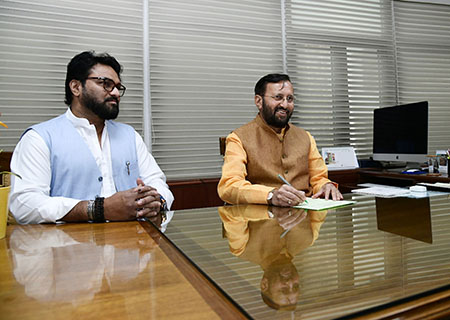No intention to impose any language, says Centre

New Delhi : Prakash Javadekar takes charge as the Union Minister for Environment, Forest and Climate Change, in New Delhi on June 01, 2019. Also seen Minister of State for Environment, Forest and Climate Change Babul Supriyo. (Photo: IANS/PIB)
New Delhi : Prakash Javadekar takes charge as the Union Minister for Environment, Forest and Climate Change, in New Delhi on June 01, 2019. Also seen Minister of State for Environment, Forest and Climate Change Babul Supriyo. (Photo: IANS/PIB)
New Delhi: The Central government said on Saturday that it has not taken a decision on the draft education policy and that there was no intention of imposing any language. The Centre’s response came amid Tamil Nadu opposition parties’ objection to the three-language formula for schools in the state as stated in the draft policy.
Information and Broadcasting Minister Prakash Javadekar said the government has not taken any decision on the draft education policy.
“The committee on new education policy has submitted its report. The government has not taken any decision on it,” Javadekar told the media.
Javadekar, who was Human Resource Development Minister in the previous NDA government, said all Indian languages will be promoted.
“Modi government has always promoted all Indian languages. Therefore, there is no case or intention of imposing any language on anybody. We want to promote all Indian languages. There should be no misunderstanding on the issue that this is a govenrment policy. It is a draft prepared by the committee which will be decided by the government only after we get public feedback,” he said.
Parties in Tamil Nadu on Saturday opposed the three-language formula for schools in the state, as stated in the draft national education policy presented by K. Kasturirangan Committee to the central government.
Speaking to reporters in Chennai, DMK Lok Sabha member Kanimozhi said her party would oppose any such move.
Reacting to the formula, actor-turned-politician Kamal Haasan said, “No language should be imposed and those who are interested can learn any language of their choice”.
S. Ramadoss, founder of the Pattali Makkal Katchi (PMK), said Hindi should not be imposed in Tamil Nadu.
The Kasturirangan Committee has recommended teaching of Hindi, English and one regional language in the non-Hindi states. For Hindi-speaking states, the committee has recommended teaching of Hindi, English and one of the modern Indian languages from other parts of the country.
However, it has not specified what the modern Indian language would be. Tamil has been accorded a classical language status by the Central government.
Published on: June 1, 2019 at 23:13 IST
IANS





